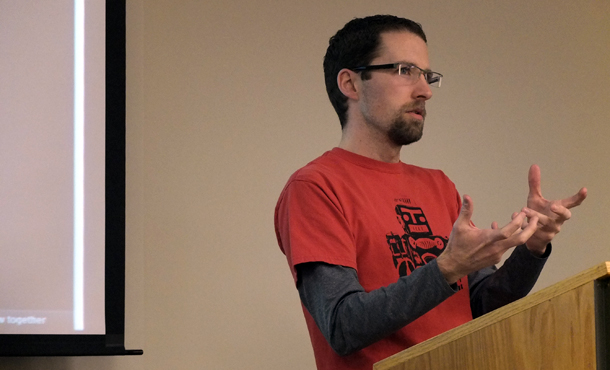Courtesy Daily News Record, April 7, 2012
Brian Gumm and Aaron Kauffman will likely never forget their capstone project at Eastern Mennonite Seminary.
That could be because this will be the pair’s final opportunity to work together, as they have throughout their four years of college. Or it could be because their project’s final activity will call for nearly 50 people to wash each other’s feet.
The students’ project is an interactive academic conference that has already sold out, more than a week ahead of schedule.
It will bring together Christian scholars from various states and denominational backgrounds for one common goal: to learn how to serve one another – and the church – better, even while living in a secular world.
“It feels really great to be wrapping up seminary with Aaron this way,” Gumm said.
Conference Details
The two have been planning the conference, named “#Occupy Empire: Anabaptism in God’s Mission,” since the fall, when national Occupy movements were fully underway.
While one of the event’s speakers was involved with Occupy Harrisonburg, it’s not just about the movement, the organizers said.
“It was more a play on the terminology,” Kauffman said, explaining the theme of the event. “It’s sort of an age-old question in the church – how do we live in the world, but not of the world?”
The theme will tie in with the conference’s final activity, foot washing.
“How are we supposed to occupy the empires of this world? How do we operate in them?” Kauffman asked. “I think we take a servant posture.”
Registration for the two-day conference, scheduled for April 13 and 14 at EMU’s Discipleship Center, has already closed.
“I really wasn’t sure what kind of response we would get,” Kauffman said. “[I was] very pleasantly surprised. I thought we would keep registration open until the day of [the event].”
The maximum capacity, because of limited funding and space, was 40. Those dozens who have signed up are from at least five states – many of them graduate students from other universities.
The conference will feature a mesh of worship services and academic presentations, some followed by formal responses from EMU professors and more casual question-and-answer periods.
There are 10 speakers total.
“Having worship services be part of an academic theology conference was an intentional move on our part to kind of bridge the gap that’s often perceived to exist between the church and the academy,” Gumm said. “We want to close that gap.”
The Theme, Realized
The discussions and presentations throughout the conference will focus on a variety of issues – art, race, alternative forms of theological education and church history, to name a few.
Living and working in what many argue is a largely secular world has become increasingly more difficult for some Christians, and the church as a whole, according to the organizers.
“It’s very challenging to be a church in a very politically polarized environment,” Kauffman said. “It does feel like, in terms of American politics, we’ve become increasingly polarized and ideological in our commitments.”
Even though Christians might belong to the same church, there are more and more people on far sides of the political spectrum, he added. And many let that interfere with church goals.
“Sometimes it feels like their political commitments are greater than their commitment to be in church together, and to me, that’s a problem.”
